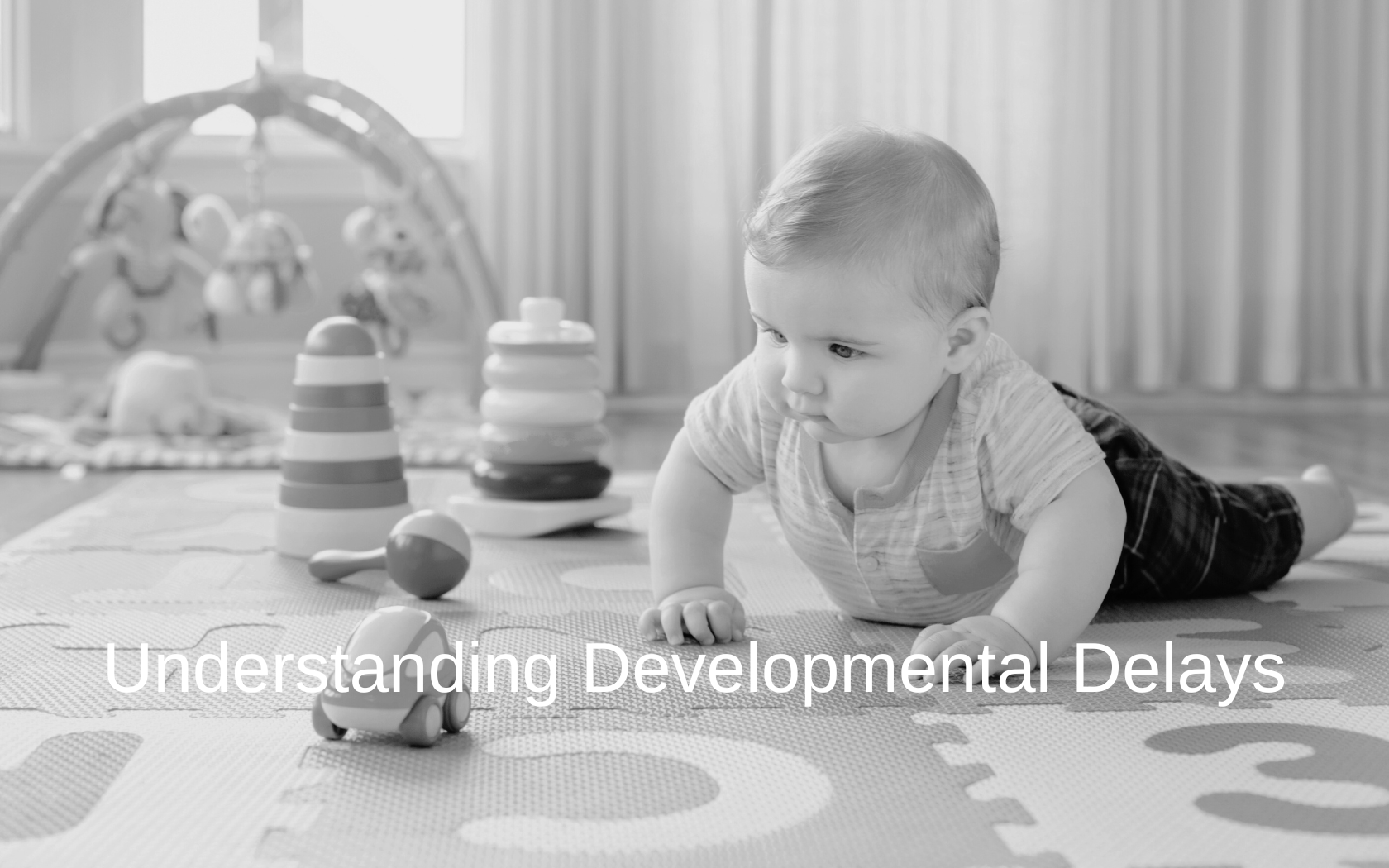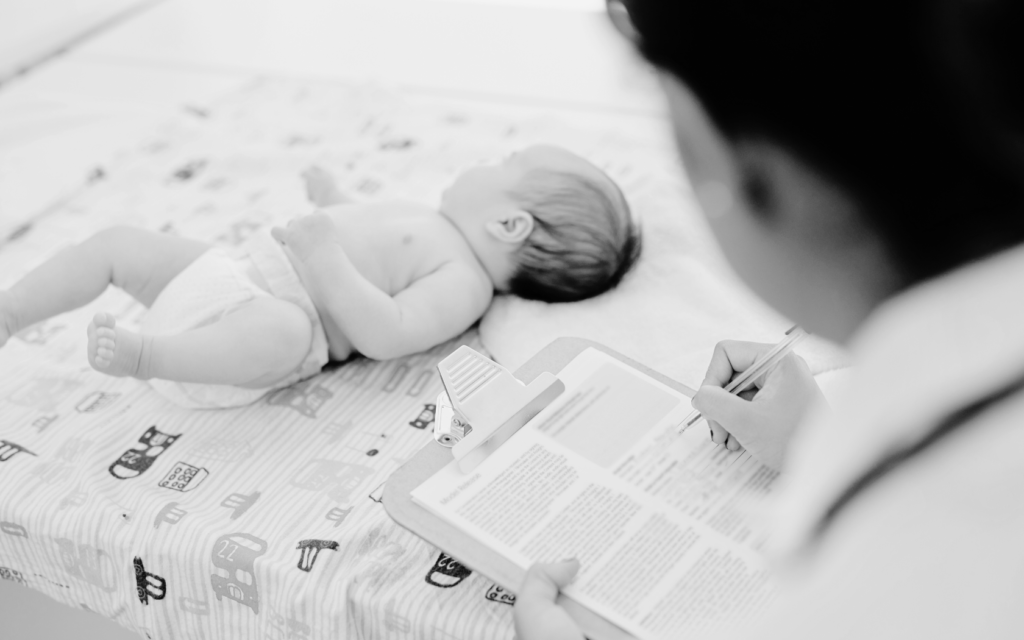Your child’s firsts, like crawling, walking, and talking, are exciting! You always want your phone ready for that “proud mama” moment. But if these milestones are delayed, it can be worrying. Could it be a developmental delay?
Below, we’ll lay out some developmental delay examples. Remember, walking and talking a bit later isn’t always cause for alarm. But sometimes missed milestones do indicate a child has a developmental disability. If you have concerns about your child’s development, we encourage you to speak to a pediatrician right away.

What are Missed Milestones?
Milestones are like “checkpoints” on a child’s journey through childhood. Missed milestones refer to benchmarks a child hasn’t reached within the expected time frame. They include skills like:
- Rolling over
- Sitting up
- Crawling
- Walking
- Talking
Missing these milestones may indicate developmental delays. When a parent or doctor notices a missed milestone, they should investigate further to make sure the child gets the support they need.
What is a Developmental Delay?
A child has a developmental delay if they keep missing milestones over a period of time.
Developmental delays can occur in different areas, such as:
- Speech and language
- Motor skills
- Cognitive abilities
- Social interactions
- Emotional regulation
Here are developmental delay examples in those five areas:
- Speech and Language: Difficulty in speaking, understanding, or using language.
- Motor Skills: Challenges in coordination, movement, or using hands and fingers.
- Cognitive: Issues with thinking, learning, problem-solving, or processing information.
- Social and Emotional: Trouble interacting with others, understanding social cues, or managing emotions.
Key Milestones by Age Group
Parents often compare their children to others, seeking reassurance about developmental progress. For instance, a mother might ask another, “Is your child talking yet? Mine is two and hasn’t said ‘dada’.”
Milestone guidelines aren’t meant to cause worry. They’re meant to help track development and spot delays early. That way, parents can be aware of any missed milestones and discuss them with a pediatrician.
Here are some key milestones divided by age groups. Note that this isn’t a complete list. You can find more milestone information on the American Academy of Pediatrics website.
1. Newborn to Three Months
- Motor Skills: Lifts head when on tummy. Makes smooth movements with arms and legs.
- Sensory and Cognitive: Follows moving objects with eyes. Recognizes familiar faces.
- Social and Emotional: Begins to smile at people. Can briefly calm themselves.
2. Four to Six Months
- Motor Skills: Rolls over. Reaches for toys and grabs them. Begins to sit without support.
- Sensory and Cognitive: Responds to sounds. Watches faces closely. Shows curiosity about objects.
- Social and Emotional: Recognizes familiar people. Responds to affection. Shows joy through smiling and laughter.
3. Seven to Nine Months
- Motor Skills: Sits without support, crawls, starts to pull up to stand.
- Sensory and Cognitive: Understands “no”. Looks for objects that are hidden.
- Social and Emotional: May be afraid of strangers. Has favorite toys. Shows a variety of emotions.
4. Ten to Twelve Months
- Motor Skills: Stands alone, may take a few steps without holding on, uses pincer grasp to pick up small objects.
- Sensory and Cognitive: Follows simple directions. Uses objects correctly (such as drinking from a cup). Begins to use basic words like “mama” and “dada”.
- Social and Emotional: Shows preferences for certain people and toys. Repeats sounds or actions to get attention.
5. Thirteen to Eighteen Months
- Motor Skills: Walks independently. Climbs furniture. Can help undress themselves.
- Sensory and Cognitive: Points to objects or pictures when named. Knows what ordinary objects are for (such as a phone or hairbrush). Follows one-step verbal commands.
- Social and Emotional: May have temper tantrums. Shows affection to familiar people. Explores alone but with a parent close by.
6. Nineteen to Twenty-four Months
- Motor Skills: Runs, kicks a ball, begins to climb up and down stairs with support.
- Sensory and Cognitive: Begins to sort shapes and colors. Completes sentences and rhymes in familiar books. Plays simple make-believe games.
- Social and Emotional: Shows more independence. Plays mainly beside other children (parallel play). Shows defiant behavior.
These guidelines provide a general idea of what to expect. But each child develops at their own pace. If you think your child has missed milestones, speak for a doctor as soon as possible.

Developmental Delay Examples
Speech Delays
Let’s discuss some examples of developmental delays. First, consider a 2.5-year-old who can’t say simple words like “mama” or “dada”. That’s an example of a speech delay. Speech therapy could help the child develop speaking abilities.
Motor Skills Delays
An example of a motor skills delay would be a 3-year-old who can’t walk, run, or climb stairs. The child might need physical therapy to help develop these skills.
Another child might struggle to hold a crayon or cut with scissors at age 4. That’s an example of a fine motor skills delay.
Cognitive Delays
By age 5, a child should be able to learn numbers, colors, shapes, or solve simple problems. A child who can’t do those things might have a cognitive delay.
Social/Emotional Developmental Delays
Lastly, let’s look at some examples of social and emotional developmental delays. Imagine a 4-year-old who doesn’t interact with peers. He avoids eye contact and throws intense tantrums when there’s a change in routine.
Remember, these developmental delay examples are just that–examples. Every child is different. A full evaluation from a pediatrician is needed in order to determine whether a child has a condition that’s causing them to have delays or missed milestones.
Causes of Developmental Delays
The question that always follows the discovery of a developmental delay is, “Why?” What could cause a child to miss milestones?
Here are some of the most common causes of developmental delays:
- Genetic factors like Down syndrome or Fragile X syndrome
- Exposure to toxins or infections during pregnancy
- Birth complications like premature birth, low birth weight, and lack of oxygen during birth
- Lack of stimulation, poor nutrition, or poor caregiving after birth
- Neurodevelopmental conditions like Autism spectrum disorder and ADHD
- An injury or infection that begins later in childhood
Developmental delays can also be caused by medical malpractice. One example of this is when doctors fail to recognize oxygen deprivation during birth. When babies don’t get enough oxygen, they can develop serious brain injuries that cause permanent health conditions, such as:
- Cerebral palsy (a group of disorders that affects movement and muscle tone)
- Intellectual disabilities (challenges with thinking and learning)
- Epilepsy (a disorder involving frequent seizures)
- Sensory impairments (Long-term effects on vision or hearing)
- Hydrocephalus (A condition where fluid accumulates in the brain. It can cause developmental delays because it puts pressure on the brain.)
Babies who have the conditions above may miss milestones because their brain injuries prevent them from experiencing normal development.

Can Developmental Delays Resolve?
Some children “outgrow” developmental delays and catch up with other kids. Others continue to experience challenges as they grow.
The outcome for a particular child depends on what caused their delays, and how severe they are. Early intervention, such as therapy, can help a child develop skills and overcome missed milestones.
If you want to help your child reach their full potential, try to make sure they see their doctor on a regular basis. They should get support tailored to their specific needs.
In addition, remember that the causes of developmental delays can be malpractice-related. If you believe foul play occurred during pregnancy or birth, you should contact a lawyer for legal advice. You may be entitled to compensation to cover your child’s treatment.
Developmental Delays FAQs
According to the CDC, most developmental delays come from a mixture of factors. The most common factors are:
– Genetic issues
– Infections during pregnancy, like cytomegalovirus
– Birth complications
– Smoking or drinking during pregnancy
– Exposure to toxins during pregnancy, like lead
Most of the time, doctors aren’t able to tell exactly what caused a child to have developmental delays. However, we do know that the top causes of intellectual disabilities are fetal alcohol syndrome, genetic conditions, and infections.
Also, 25% of hearing loss in babies comes from maternal infections, head trauma, and complications after birth.
Yes, some children with developmental delays can catch up to their peers. However, they’re more likely to recover when their disability is mild, and they get early medical support. Without early intervention, developmental delays can worsen.
Some of the things you can do to help a child with a developmental delay catch up include:
– Making sure your child sees the doctor on a regular basis.
– Getting early intervention support and following the treatment plan.
– Interacting with your child as much as you can. Play with them and read books to them.
– Limiting screen time.
– Creating a routine so your child has an easier time following instructions.
A person with an intellectual disability usually has an IQ score below 70. There are several levels of severity:
– Mild: IQ between 50-70
– Moderate: IQ between 35-50
– Severe: IQ between 20-35
– Profound: IQ below 20
But IQ is just one way to assess intellectual disability. A person with an intellectual disability could also have low functional and adaptive skills. These skills involve the ability to do day-to-day activities.




